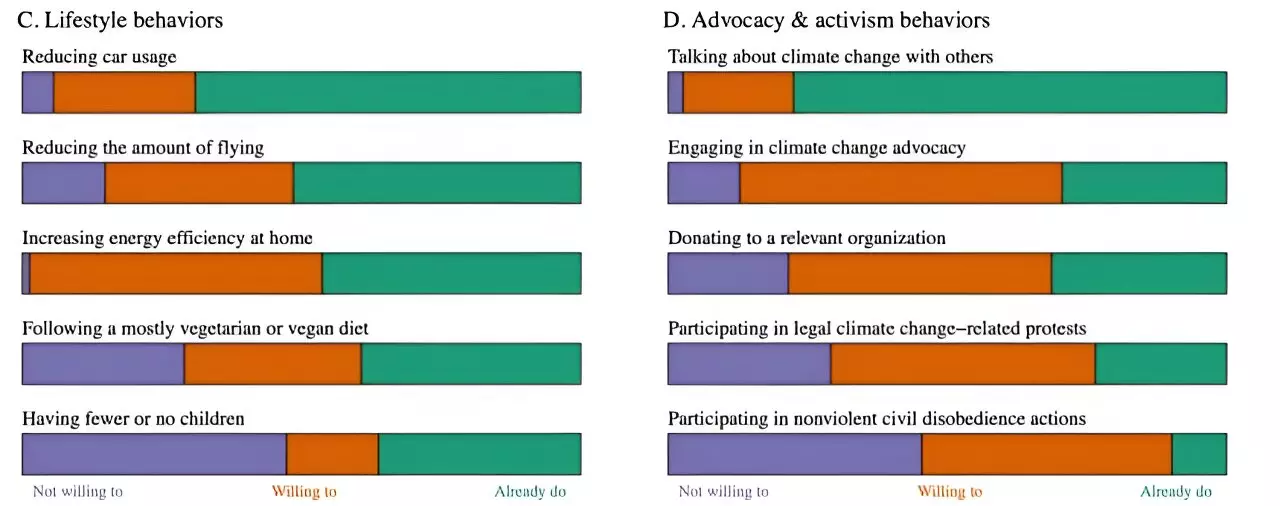Climate change has emerged as one of the most pressing threats humanity faces today, eliciting concern from scientists across various academic fields. A comprehensive survey led by the University of Amsterdam has shed light on these concerns, revealing not only the pervasive anxiety among researchers but also their growing tendencies toward lifestyle changes and climate advocacy. The study’s findings call attention to how scientists can serve as catalysts for climate action beyond their laboratories, highlighting a collective responsibility to engage actively in addressing this global crisis.
The survey, which boasted over 9,000 responses from researchers spanning 115 countries and multiple disciplines, indicates a significant sentiment shift within the scientific community. Approximately 83% of respondents reported feeling “quite a bit” or “a great deal” worried about climate change. Perhaps even more striking is the near-universal consensus (91%) among scientists that transformational changes in social, political, and economic spheres are imperative to effectively tackle climate change.
This pervasive concern is further exacerbated by the alarming reality that many scientists actively recognize the necessity of modifying personal behaviors. The data reveals that 69% of respondents have made a conscious effort to drive less, while 51% have reduced air travel, and 39% have transitioned towards a more plant-based diet. Such shifts in personal lifestyle reflect a growing awareness that meaningful change must begin at an individual level.
Interestingly, the study indicates that scientists are becoming increasingly willing to advocate for climate awareness, engaging with activist movements, and participating in protests. Nearly 29% have already taken part in climate advocacy, with 23% endorsing legal protests and 10% even resorting to civil disobedience. This trend highlights both a willingness to act and an underlying frustration with the slow governmental response to climate change.
The research emphasizes that many scientists feel that their voices matter in the climate conversation and believe that their advocacy could contribute positively to climate action. A substantial portion of respondents (nearly half) expressed openness to future involvement in advocacy, emphasizing a readiness to overcome potential barriers.
Despite these encouraging statistics, both intellectual and practical barriers impede many scientists from fully engaging in activism. The two-step model proposed by lead researcher Fabian Dablander highlights that intellectual barriers, such as doubts about the effectiveness of activism and fears of losing credibility, often deter scientists from participation.
Practical challenges such as time constraints, lack of skills, and limited awareness of existing climate action groups also present hurdles. Understanding these barriers is crucial for fostering an environment where scientists can engage meaningfully in climate activism. Strategies to mitigate these obstacles, such as forming connections between active and inactive researchers, could pave the way for enhanced involvement.
To fully mobilize the scientific community towards climate advocacy, institutional reforms are vital. Proposals include allocating more resources—both time and funding—to scientific efforts that prioritize climate action and public engagement. Offering incentives for scientists to contribute to climate-related discussions can nurture a culture that prioritizes responsibility and action, rather than passive observation.
Professor Adam Aron, a co-author of the study, articulates the frustration many scientists feel with the current pace of change brought forth by governments and corporations. The persistent failure to meet the urgency of the crisis is a compelling motivator for scientists to step outside their traditional academic roles.
The compelling findings from this international survey illuminate a budding movement within the scientific community, one that seeks to transcend academic research and embrace activism. As scientists increasingly recognize the existential threat posed by climate change, their collective voices call for a transformation that is both fundamental and urgent.
By fostering collaboration, providing institutional support, and dismantling barriers to engagement, the scientific community can leverage its resources and expertise to combat climate change effectively. Now more than ever, the responsibility lies with each individual to align their actions and choices with the broader goal of ensuring a sustainable future for the planet.
The challenge is immense, but the response must be equally robust. Scientists who are concerned, willing, and ready for action hold the potential to make a significant impact that transcends their research—paving the way for a united front against the climate crisis.

